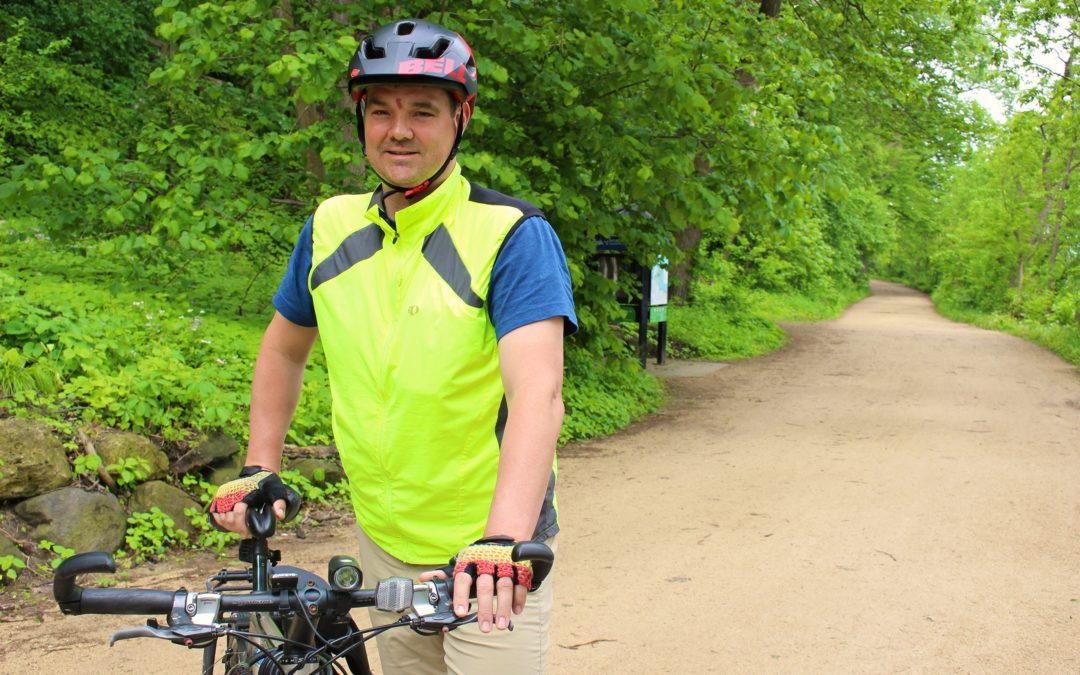
by Jodi Jean Amble | Aug 3, 2018 | Solar
MADISON, Wis. – A University of Wisconsin-Madison professor is biking 2,000 km around the Upper Midwest beginning on July 28th to increase awareness of solar energy and raise funds for a solar energy project in Puerto Rico.
The bike journey, known as #BiketheSun, will take James Tinjum, Ph.D., of UW’s Department of Engineering Professional Development to 50 solar energy sites across Wisconsin, Illinois, Iowa and Minnesota. Riding an electric bike prototype with a plan to bike 160 km per day, the trip will take Tinjum about two weeks to complete.
“Solar is an energy solution that provides clean, renewable, domestic energy across the U.S.,” said Tinjum. “In the last year, if you include rooftop solar, about 2.5 percent of our nation’s electrical supply came from solar. Although this energy source is growing, there is still a lot of room for expansion.”
Along with bringing attention to solar energy, the purpose of #BiketheSun is to raise funds for Solar Para Niños, a solar installation project at a non-profit shelter in Puerto Rico for abused children. The panels will reduce the shelter’s energy costs by as much as $1,000 per month, allowing the shelter to invest more money into educational and counseling services the children. The project will help provide long-term, sustainable relief after Hurricane Maria devastated the island last September.
“Puerto Rico’s power grid was completely knocked out during the hurricane and electricity was not restored across the island for as long as nine months after. Renewable, distributed energy sources like solar will provide more resilient and reliable power, particularly for when another natural disaster occurs,” Tinjum said.
Puerto Rico has the highest electricity rates in the U.S., according to Tinjum. Even though the island has excellent solar resources, it produces over 95 percent of its electrical energy by burning imported natural gas, coal and oil – which are not only expensive, but environmentally unsustainable.
“With the installation and promotion of more renewable sources such as solar energy, institutions like the children’s shelter will substantially reduce their monthly energy bill, as well as move toward a more sustainable use of energy,” he said.
Last summer, Tinjum embarked on a 2,000-km bike ride called #BiketheWind to raise awareness about wind energy, so he’s familiar with long trips triggered by good causes. To prepare for this year’s ride, Tinjum is biking upwards of 24 hours a week, getting in hours by biking to “everything,” including work, groceries and intramural soccer matches.
Tinjum departs for his journey on Saturday, July 28 from Madison, Wisconsin.
To keep up with his journey, visit solarparaninos.com/bikethesun and follow #BiketheSun on social media. Visit solarparaninos.com/donate to donate to the Solar Para Niños project fund.
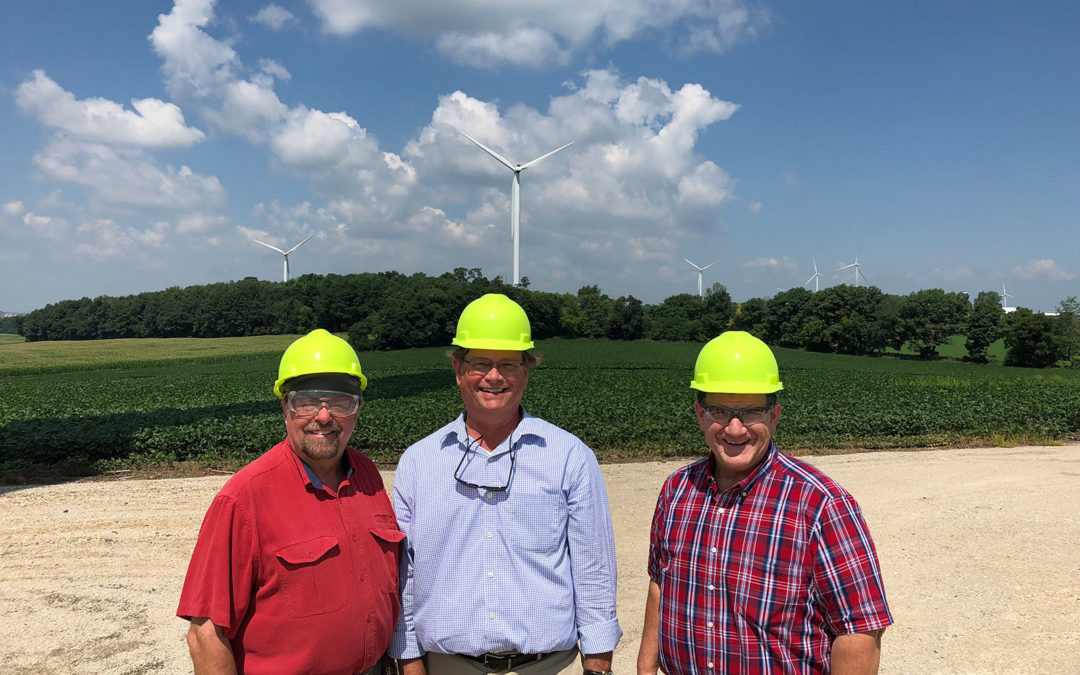
by Jim Boullion | Jul 30, 2018 | Events, Hydroelectric, RENEW Wisconsin, Renewables, Solar, Wind
Cedar Ridge Wind Farm
On July 24th Alliant Energy hosted a tour of their Cedar Ridge Wind Farm in Fond du Lac County for several state legislators to discuss not only wind, but all of the latest developments in renewable energy. Built in 2008, Cedar Ridge was one of the first wind installations in the state. Alliant Energy owns and operates this site of 41 turbines that has a capacity of generating 68 mW of electricity, enough to power 17,000 homes. In its 10 years of existence, Alliant calculates that the electric power generated by these wind turbines allowed them to avoid burning enough coal to fill a 99-mile-long coal train! Alliant currently owns 569 mW of total wind power, but because of falling costs, efficiency gains of the turbines, and inexpensive operations and management, they expect to invest in an additional 1,150 mWs of wind generation by 2021. Representatives Bob Kulp and Rick Gundrum came away impressed and posted very positive comments online about the tour and the many developments in renewable energy.
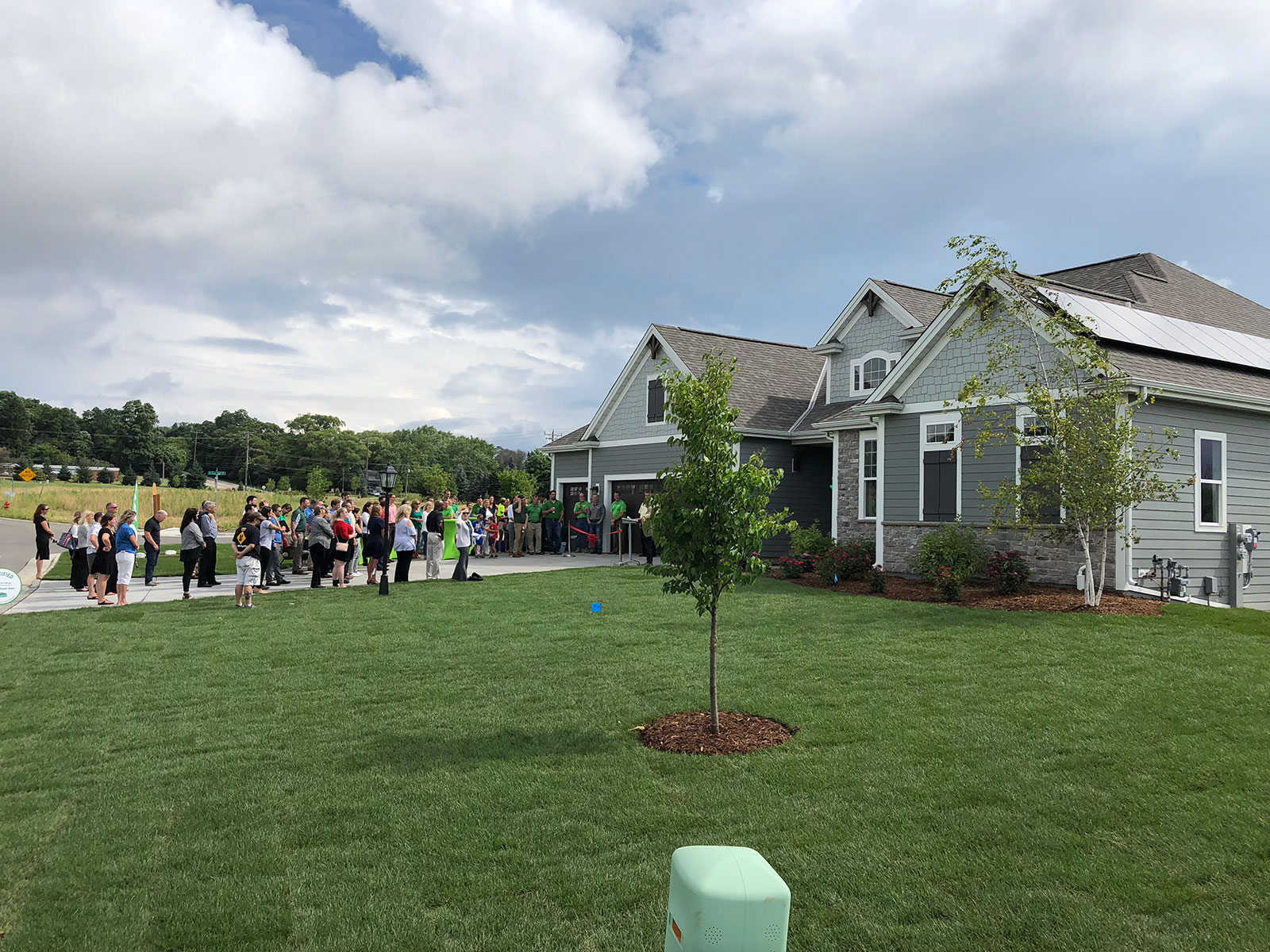
Tim O’Brian Homes Net Zero Community
On July 20th I visited a ribbon cutting for the new Tim O’Brian Homes Net Zero Community in New Berlin. This all-solar subdivision is the first of its kind in Wisconsin. In partnership with Neumann Companies and SunVest Solar, Inc., they are developing the Red Fox Crossing subdivision with a focus on sustainability and energy efficiency. Not only is every home in the subdivision designed from the ground up to include 6 to 8 kW photovoltaic solar arrays, but they are also certified ENERGY STAR® V3 National Qualified Homes. “Buyers are looking for ways to save on their true cost of homeownership,” says Angela Cooper, Milwaukee Division President of Tim O’Brien Homes. “The upfront costs of building a net zero home might be slightly more than a code-built home but the money saved in monthly utility bills results in an overall less expensive home.” The subdivision has been popular, with half of the 34 units already sold. “Red Fox Crossing has the potential to be the turning point in building a more sustainable community in Wisconsin, versus focusing on only one home at a time,” says Tim O’Brien, President of Tim O’Brien Homes. ”

Badger Hydroelectric Plant
On July 13th I joined State Senator Rob Cowles (District 2-Green Bay) and Representative Dave Murphy (District 56-Greenville) on a tour of the Badger Hydroelectric plant in Kaukauna. The visit was hosted by the Kaukauna Municipal Utility, a member of WPPI Energy. As noted in this WBAY news story, the visit was designed as a discussion about renewable energy of all kinds. Hydroelectric power was one of the first, and least expensive sources of electric power. The Kaukauna facility is 110 years old and had a major upgrade in 2013, giving it a capacity of 7 mW of power, up 40% from the capacity of its two old powerhouses. During the meeting we discussed the dropping prices for wind and solar power and the tremendous amount of renewable energy that is currently listed on the 4-year MISO planning queue. It was noted that WPPI Energy, Dairyland Power and the investor owned utilities are looking to close their coal burning power plants and invest in utility scale wind and solar projects. They are doing this because wind and solar cost less than coal and the rising customer demand for renewable energy. This competitive, market-driven demand for renewable energy has led Wisconsin to easily surpass the 10% Renewable Portfolio Standard (RPS) that was established by the state legislature in 2006, and shows no signs of slowing!

Governor Walker Helps Energy Bank Announce Renewable Energy Lighting
On July 9th I was invited by Energy Bank, Inc. to attend the unveiling of a new product called FUSION. Neal Verfuerth, owner of Energy Bank, invented this new lighting system that uses the DC power output from photovoltaic solar panels to directly energize LED fixtures – without conversion to AC. Governor Scott Walker gave the keynote speech where he said Wisconsin companies understand the need to keep their peak energy demand low and reduce the overall cost of energy to be economically viable. Walker said that businesses understand that “to be environmentally sustainable, you need to be economically sustainable”, and products like FUSION make that happen. The Governor was excited about innovative and high-tech companies like Energy Bank locating in Wisconsin, creating the new era technologies that will create jobs and attract millennial workers to Wisconsin. I had a few minutes to speak with both the Governor and Representative Paul Tittl (District 25-Manitowoc) at the end of the event about the exciting advancements and fast falling prices that renewable energy has had in the last few years. They were very interested and are looking forward to working with RENEW to help keep that momentum going.

The 29th Annual Energy Fair
On the weekend of June 15-18 I had the pleasure of visiting the MREA Energy Fair in Custer. This was my first visit to the Energy Fair and all I can say is that I was blown away! They had an amazing number of great seminars (over 250) on renewable energy, energy conservation and sustainable practices of all kinds. I was able to see, sit in and learn about many different electric vehicles (over 70 of them were on-site) and discuss with EV aficionados what the exciting future of transportation might look like. There were also over 450 exhibitors, presenters and sponsors from around the country. There were great speakers, entertainment and interesting people everywhere you looked. Everyone was up-beat and excited about renewable energy and how quickly it is taking over the energy market. Finally, the most fun part of the weekend was having me drive the RENEW Wisconsin electric demolition derby car. I won my initial heat and was in the final event. A controversial call by the umpires and a slight miscalculation on my part kept me out of the winner’s circle, but at the end of the evening everyone was a winner and we all had a great time!!
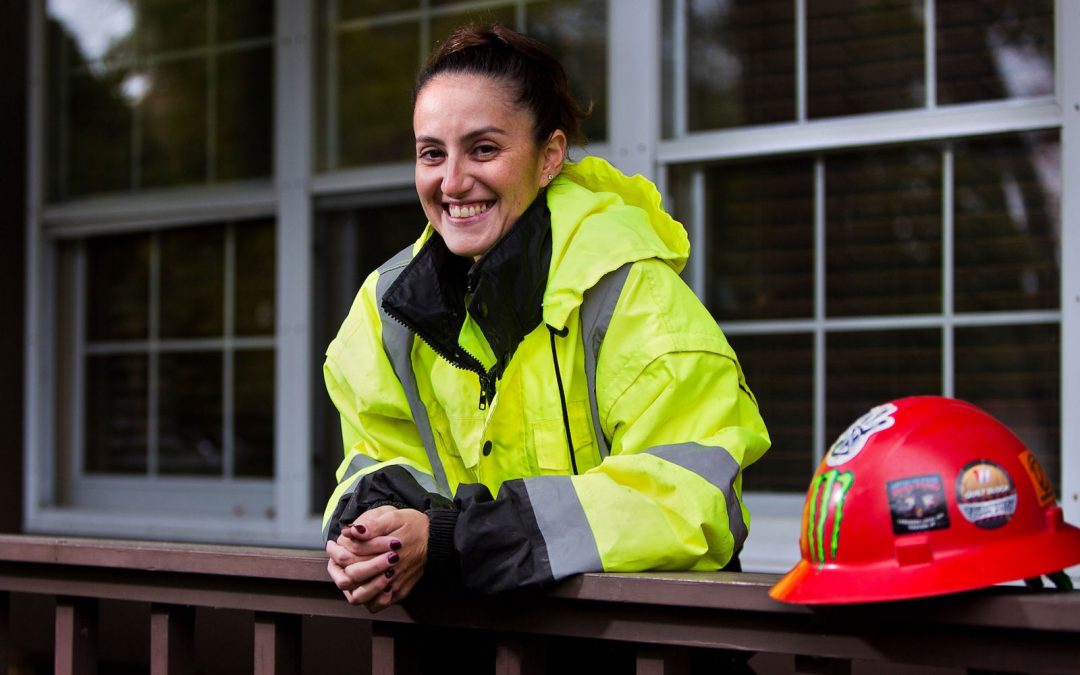
by Jodi Jean Amble | Jul 25, 2018 | RENEW Wisconsin, Renewables, Solar, Wind
Last fall, I was asked to help promote a series called Names behind the Numbers, profiling Wisconsin’s renewable energy workers. One of the interviews featured April Smith (pictured above), a construction worker on the Quilt Block Wind Farm in Darlington, WI. In describing her work she said “All the people, the company, and the community — everyone looked out for each other” and I thought “that’s Wisconsin.”
I grew up in the northeast corner of Iowa County, in the Wisconsin River valley in a small town called Arena. My grandmother cleaned houses, my dad was a mechanic turned landscaper, and my uncles worked road construction. I was surrounded by the grit and community that defines the Wisconsin work ethic; I was taught to work hard, work together, and get the job done.
Now I am one of Wisconsin’s clean energy workers. I joined the RENEW Wisconsin staff a year ago with an untraditional background: an arts education, a theater and music career, and eight years of marketing for a general contractor in Chicago. I knew little about renewable energy, but I cared about the environment and wanted to help build a cleaner future for my children.
According to the Department of Energy’s 2017 US Energy and Jobs Report Wisconsin, over 67,000 people are already working in clean energy, and renewable energy job growth is six times faster than overall job growth in the state. Wisconsin has the opportunity to increase renewable energy substantially in the coming decades, and create tens of thousands of jobs along the way.
After April’s story was published, I was able to attend the Quilt Block dedication and ribbon cutting in Darlington, WI. I witnessed firsthand a community (comprised of local landowners, businesses, educators, government officials, and EDP Renewables) working together to build a 98 MW wind farm, enough to power 25,000 Wisconsin homes with clean energy. This project created approximately 100 full-time jobs during construction and 12 permanent jobs.
I recently attended an outdoor BBQ at the local office of the proposed Badger Hollow Solar Project in Monfort, WI. This was an opportunity for local landowners to get together and see which of their neighbors would be growing a solar crop. There, I met Tracy Fillback, the local liaison hired to address questions and concerns from the landowners and the community as this project progresses. She spent the last few years at home raising her children and now she’s starting a new chapter as part of of the Badger Hollow Solar project. She is another example of renewable energy job opportunity in Wisconsin.
Wind developers are scoping out new projects in rural parts of the state and in recent weeks two proposals for large scale solar farms have joined Badger Hollow Solar at the review stage of development. While we can’t predict the exact number of jobs this will mean for Wisconsin, these companies and workers will spend millions of dollars on locally-sourced gravel, concrete, construction supplies, food, lodging and other services. Increasing renewable energy is one of the best economic development moves Wisconsin could make, particularly for its rural communities.
Wisconsin’s renewable energy workers are building a cleaner future for our children and they’re doing it the Wisconsin way; with tenacity, community, and hard work. Renewable energy can support our local economies and be as homegrown as the crops in our fields, if our communities can continue to embrace the possibilities.
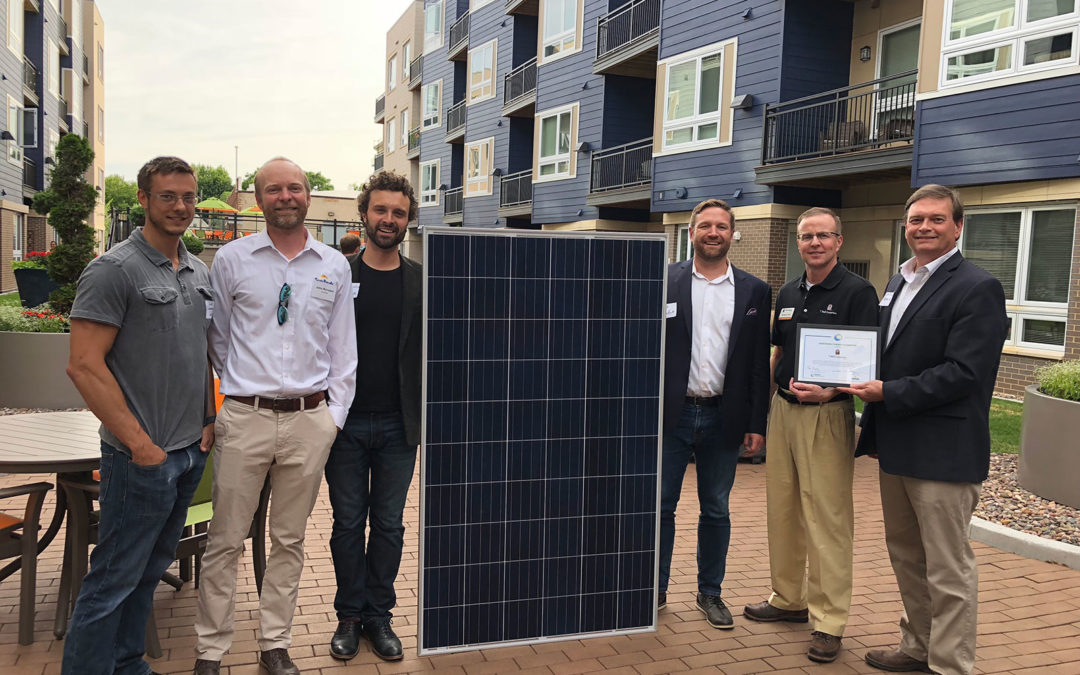
by Jim Boullion | Jun 28, 2018 | Biogas, Solar
Puerto Rico Learns about Renewable Energy in Madison
On May 29th Madison Mayor Paul Soglin asked RENEW Wisconsin to join him and his staff to meet with Bernardo Márquez Garcia, Mayor of Toa Baja, Puerto Rico, as they discussed some of the renewable energy initiatives that Madison has in place and ways that cities in Puerto Rico might use renewable energy to help reestablish electric service and make it more reliable.
“That is so important because in the remote areas of the island and so many critical areas of the city there is a need when the hurricane strikes, when the power system goes down, to have electric power,” Soglin said.
Bubolz Nature Preserve Unveils Off-Grid Microgrid
On May 31st I was very excited to head to Appleton where Faith Technologies, in partnership with Schneider Electric, unveiled the state-of-the-art, clean energy microgrid they designed and built at the Gordon Bubolz Nature Preserve in Appleton.
As one of the keynote speakers at the event, Senator Roger Roth praised the project and the Bubolz Nature Preserve for the great work they do. Many other local officials were on hand to learn more about the project including Senator Rob Cowles, Representative Mike Rohrkaste and Outagamie County Executive Tom Nelson.
As one of the most advanced microgrids in existence, the Gordon Bubolz Nature Preserve project acts as a testing and demonstration site for increasingly sophisticated microgrid operations, showing how advanced controls and operation optimization combined with state of the art technology can work together to provide clean, reliable power.
The advanced microgrid uses a 200-kW solar photovoltaic array; C-Series Proton On Site Hydrogen Generator; 30-kW hydrogen fuel cell; a 100-kW Tesla lithium-ion battery storage system; a 65-kW micro-turbine; and a 60-kW Kohler natural gas generator. Together they allow the system to completely disconnect from the utility grid and still operate the 18,000-square-foot nature center building, with power to spare!
Crave Brothers Open House
On June 13th I visited the Crave Brothers Dairy Farm in Waterloo for a very well attended Green Energy Showcase event designed to educate the public and government officials about their unique operation that integrates raising crops, a dairy farm, cheese making operation and a biodigester system.
Attending the event were Wisconsin DATCAP Secretary Sheila Harsdorf, State legislative staff and U.S. Deputy Secretary of Agriculture Steve Censky. While addressing the crowd, Censky praised the Crave Brothers operation, “There are many wonderful innovations happening in agriculture,” he said, “This is just one example of those projects.”
The two 750,000-gallon biodigester tanks located on the farm process manure from 2,600 cows. Other organic byproducts, such as cheese whey and food waste, also go into the biodigester, producing enough methane to generate 633 kilowatts of electricity from the adjacent generator, enough electricity to power the farm, the cheese factory and more than 300 homes in the Waterloo area.
T-Wall Enterprises Leading the Way on Multi-Family Solar
On June 14th RENEW Wisconsin recognized T-Wall Enterprises with a “Renewable Energy Champion” award for their support of renewable energy. T-Wall worked with SunPeak to install solar arrays on four of its multifamily properties —Veritas Village, Tribeca 1, Tribeca 3 and Wingra Point — for a total of 431 kW of onsite solar generation. As of June 2018, T-Wall Enterprises has put in place more solar capacity than any other developer of multifamily dwellings active in Wisconsin.
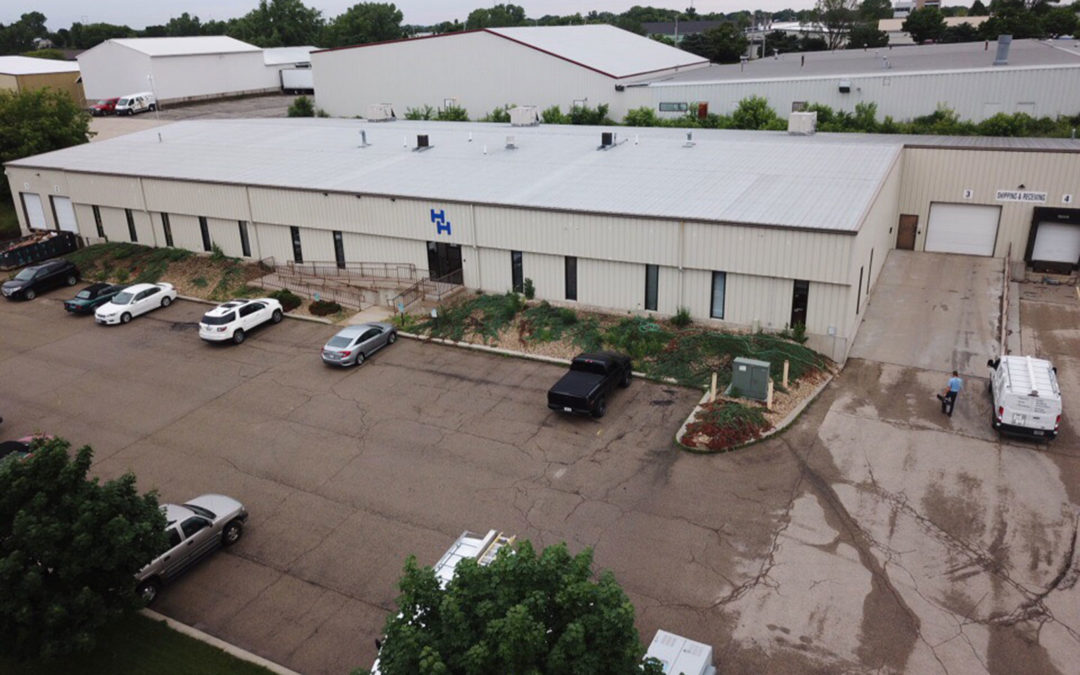
by Jodi Jean Amble | Jun 28, 2018 | Local Initiatives, PACE, Solar
The H&H Energy Services building located at 818 Post Road in Madison is the latest Wisconsin business to benefit from commercial Property Assessed Clean Energy (PACE) financing available through PACE Wisconsin. H&H Energy Services plan to offset the majority of their warehouse’s electrical use by installing roof upgrades, a 57 kilowatt photovoltaic (PV) system, along with rooftop heating and cooling units to the one-story 25,200 square foot building. Through the combination of energy savings and reduction in operating costs achieved through these improvements H&H Energy Services will offset the cost of the investment.
PACE is a means of financing energy and water efficiency upgrades, as well as renewable energy installations for commercial and industrial properties. PACE financing can fund up to 100% of the cost of eligible building improvements, and allows property owners to exchange equity with non-recourse financing. Financing options of up to 30 years yield positive cash flows, and increase the net operating income for commercial and industrial building owners. Financing costs can be passed on to tenants as part of their property tax, and therefore benefit tenants and property owners alike.
PACE Wisconsin is administered by Energy Finance Solutions (EFS), the financial services division of the Wisconsin Energy Conservation Corporation (WECC). “As an early adopter, H&H Energy Services will be able to use the benefits of commercial PACE financing as a competitive advantage in the market. Having gone through the PACE financing experience first-hand, H&H will be able to help their clients realize the benefits of this innovative project finance tool,” explained Jason Stringer, Senior Manager Clean Energy Finance for WECC EFS, and PACE Wisconsin Administrator.
The lender for the project is Greenworks Lending, a national lender that currently provides financing in 11 Commercial PACE enabled states. PACE Wisconsin currently works with thirteen lenders, of which four are located in Wisconsin. Thirty counties in Wisconsin have approved an ordinance to participate in PACE Wisconsin—meaning property owners in those counties are now eligible to apply for PACE financing. For more information on PACE Wisconsin and how it helps property owners, businesses, local governments, and contractors, visit pacewi.org.
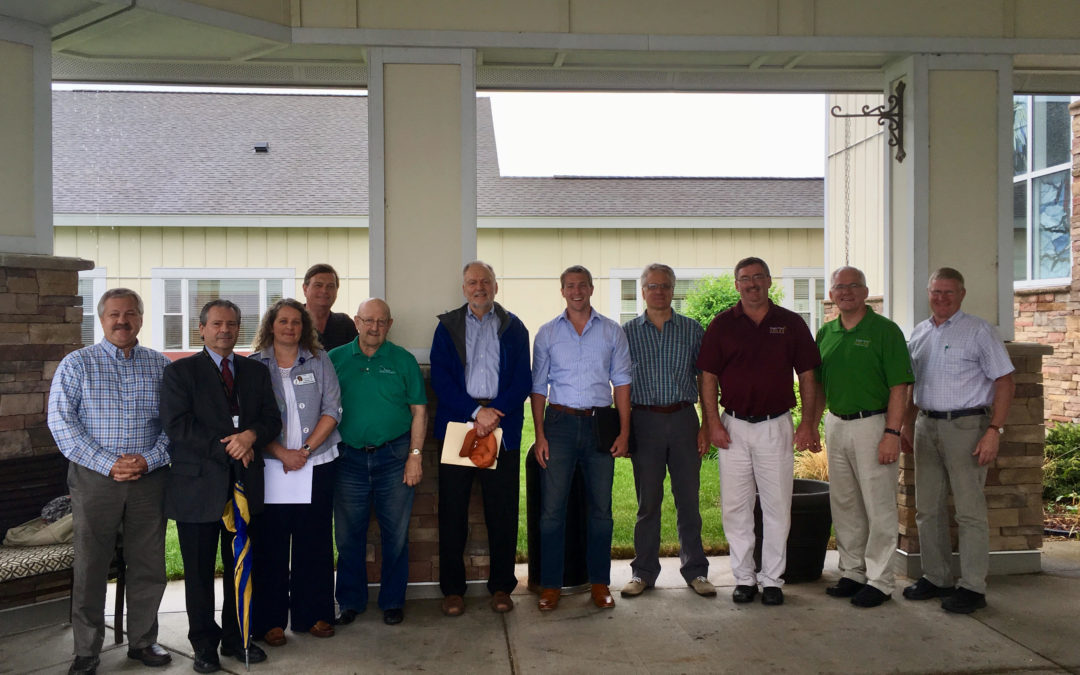
by Jim Boullion | Jun 11, 2018 | Focus on Energy, Solar
RENEW’s summer tour of renewable energy projects to help educate legislators and local officials about renewable energy continued on May 30th, as I helped to coordinate a visit for State Senator Howard Marklein, Representative Ed Brooks and Jon Hochkammer of the Wisconsin Counties Association to the Sauk County Health Care Center to showcase a new solar project that was one of two arrays that were approved last year by the Sauk County Board.
The project was made possible through the use of a third-party investor that allows the county to benefit from the projects without any upfront cash outlay. Eagle Point Solar, who built the project, is also the initial investor/owner of the installations. Financing for the project, which included a Focus on Energy grant, provides an option for the county to purchase the arrays after seven years and potentially save money on their utility bills. The cumulative cash flow savings from both projects over a 25-year period is projected to be more than $550,000 for the county!
As quoted in a local newspaper story, Mark Hanson, director of sustainable services for Hoffman Planning, Design and Construction who helped coordinate the project said “It is groundbreaking for a Wisconsin county because some counties are just getting into it with this combination of both the solar and third-party financing.”
Eagle Point Solar General Manager Jim Pullen said from an investor’s standpoint, there are advantages to having another party in the project. “We have the ability to monetize the tax credits and monetize the depreciation and therefore our cost to build this solar array is less than if the county just wrote us a check,” Pullen said. “Therefore we pass that lower cost back to the county by way of a lower energy rate.”










